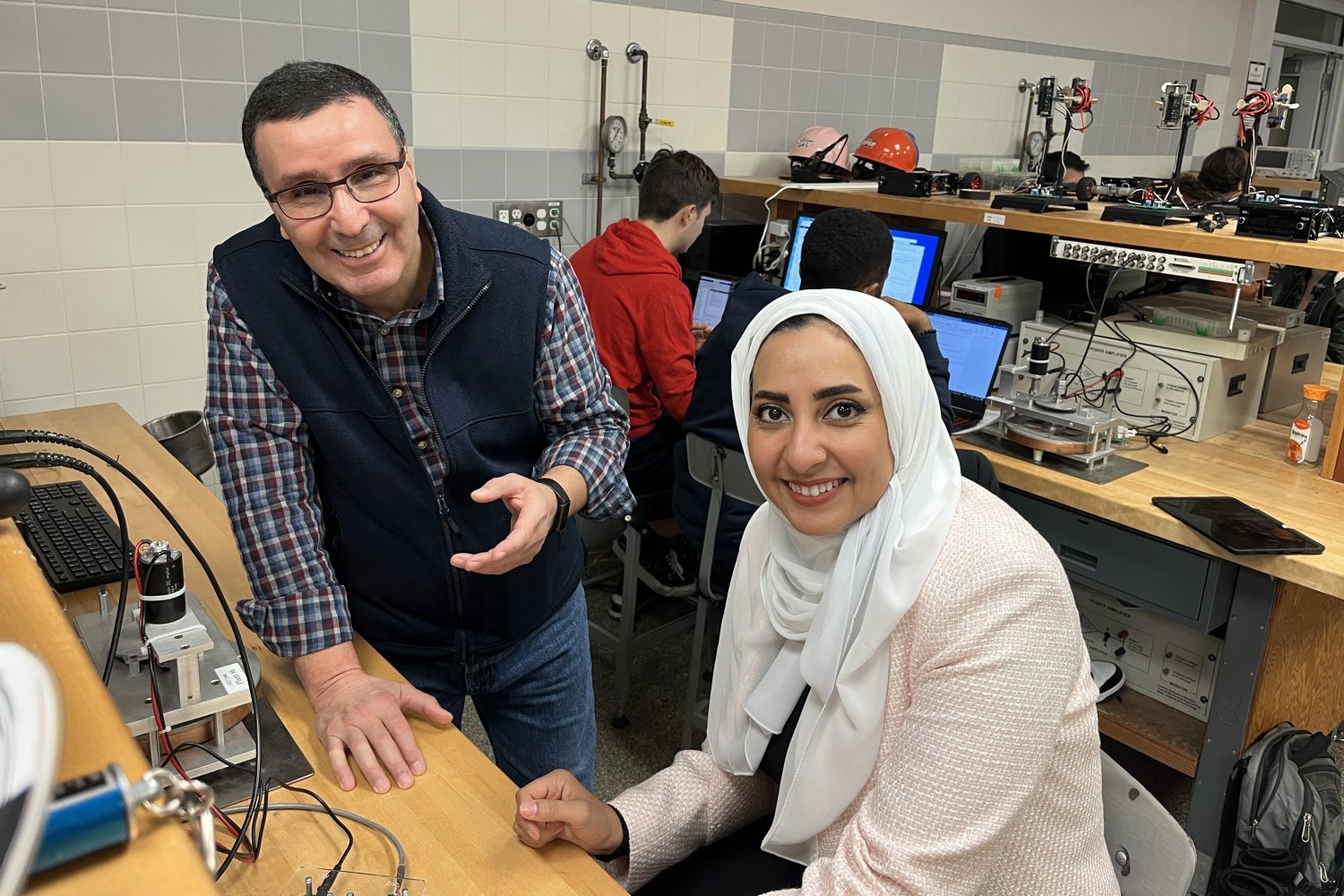Lisa Capone | Office of the Vice Provost for International Activities
2024-12-20 11:20:00
news.mit.edu

When the Global MIT At-Risk Fellows (GMAF) initiative launched in February 2024 as a pilot program for Ukrainian researchers, its architects expressed hope that GMAF would eventually expand to include visiting scholars from other troubled areas of the globe. That time arrived this fall, when MIT launched GMAF-Palestine, a two-year pilot that will select up to five fellows each year currently either in Palestine or recently displaced to continue their work during a semester at MIT.
Designed to enhance the educational and research experiences of international faculty and researchers displaced by humanitarian crises, GMAF brings international scholars to MIT for semester-long study and research meant to benefit their regions of origin while simultaneously enriching the MIT community.
Referring to the ongoing war and humanitarian crisis in Gaza, GMAF-Palestine Director and MIT Professor Kamal Youcef-Toumi says that “investing in scientists is an important way to address this significant conflict going on in our world.” Youcef-Toumi says it’s hoped that this program “will give some space for getting to know the real people involved and a deeper understanding of the practical implications for people living through the conflict.”
Professor Duane Boning, vice provost for international activities, considers the GMAF program to be a practical way for MIT to contribute to solving the world’s most challenging problems. “Our vision is for the fellows to come to MIT for a hands-on, experiential joint learning and research experience that develops the tools necessary to support the redevelopment of their regions,” says Boning.
“Opening and sustaining connections among scholars around the world is an essential part of our work at MIT,” says MIT President Sally Kornbluth. “New collaborations so often spark new understanding and new ideas; that’s precisely what we aim to foster with this kind of program.”
Crediting Program Manager Dorothy Hanna with much of the legwork that got the fellowship off the ground, Youcef-Toumi says fellows for the program’s inaugural year will be chosen from early- and mid-career scientists via an open application and nominations from the MIT community. Following submission of applications and interviews in January, five scholars will be selected to begin their fellowships at MIT in September 2025.
Eligible applicants must have held academic or research appointments at a Palestinian university within the past five years; hold a PhD or equivalent degree in a field represented at MIT; have been born in Gaza, the West Bank, East Jerusalem, or refugee camps; have a reasonable expectation of receiving a U.S. visa, and be working in a research area represented at MIT. MIT will cover all fellowship expenses, including travel, accommodations, visas, health insurance, instructional materials, and living stipends.
To build strong relationships during their time at MIT, GMAF-Palestine will pair fellows with faculty mentors and keep them connected with other campus communities, including the Ibn Khaldun Fellowship for Saudi Arabian Women, an over 10-year-old program that Youcef-Toumi’s team also oversees.
“MIT has a special environment and mindset that I think will be very useful. It’s a competitive environment, but also very supportive,” says Youcef-Toumi, a member of the Department of Mechanical Engineering faculty, director of the Mechatronics Research Laboratory, and co-director of the Center for Complex Engineering Systems. “In many other places, if a person is in math, they stay in math. If they are in architecture, they stay in architecture and they are not dealing with other departments or other colleges. In our case, because students’ work is often so interdisciplinary, a student in mechanical engineering can have an advisor in computer science or aerospace, and basically everything is open. There are no walls.”
Youcef-Toumi says he hopes MIT’s collegial environment among diverse departments and colleagues is a value fellows will retain and bring back to their own universities and communities.
“We are all here for scholarship. All of the people who come to MIT … they are coming for knowledge. The technical part is one thing, but there are other things here that are not available in many environments — you know, the sense of community, the values, and the excellence in academics,” Youcef-Toumi says. “These are things we will continue to emphasize, and hopefully these visiting scientists can absorb and benefit from some of that. And we will also learn from them, from their seminars and discussions with them.”
Referencing another new fellowship program launched by MIT, Kalaniyot for Israeli scholars, led by MIT professors Or Hen and Ernest Fraenkel, Youcef-Toumi says, “Getting to know the Kalaniyot team better has been great, and I’m sure we will be helping each other. To have people from that region be on campus and interacting with different people … hopefully that will add a more positive effect and unity to the campus. This is one of the things that we hope these programs will do.”
As with any first endeavor, GMAF-Palestine’s first round of fellowships and the experiences of the fellows, and the observations of the GMAF team, will inform future iterations of the program. In addition to Youcef-Toumi, leadership for the program is provided by a faculty committee representing the breadth of scholarship at MIT. The vision of the faculty committee is to establish a sustainable program connecting the Palestinian community and MIT.
“Longer term,” Youcef-Toumi says, “we hope to show the MIT community this is a really impactful program that is worth sustaining with continued fundraising and philanthropy. We plan to stay in touch with the fellows and collect feedback from them over the first five years on how their time at MIT has impacted them as researchers and educators. Hopefully, this will include ongoing collaborations with their MIT mentors or others they meet along the way at MIT.”
Upgrade your audio game with the Logitech for Creators Blue Yeti USB Microphone. With over 33,730 ratings and an impressive 4.6 out of 5 stars, it’s no wonder this is an Amazon’s Choice product. Recently, 5K+ units were purchased in the past month.
Available in five stunning colors: Teal, Silver, Pink Dawn, Midnight Blue, and Blackout, this microphone is perfect for creators looking to produce exceptional audio. Priced at only $84.99, it’s a deal you can’t afford to miss.
Elevate your recordings with clear broadcast-quality sound and explore your creativity with enhanced effects, advanced modulation, and HD audio samples. Order now for just $84.99 on Amazon!
Support Techcratic
If you find value in Techcratic’s insights and articles, consider supporting us with Bitcoin. Your support helps me, as a solo operator, continue delivering high-quality content while managing all the technical aspects, from server maintenance to blog writing, future updates, and improvements. Support Innovation! Thank you.
Bitcoin Address:
bc1qlszw7elx2qahjwvaryh0tkgg8y68enw30gpvge
Please verify this address before sending funds.
Bitcoin QR Code
Simply scan the QR code below to support Techcratic.

Please read the Privacy and Security Disclaimer on how Techcratic handles your support.
Disclaimer: As an Amazon Associate, Techcratic may earn from qualifying purchases.



































































































